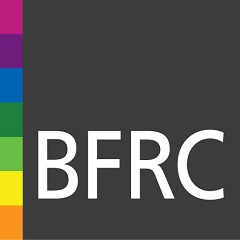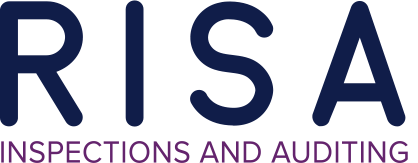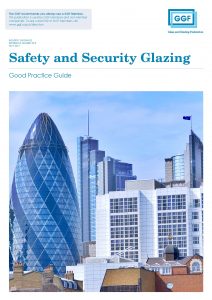
Search Results for: Safety Glazing
20.5 Guide to Good Practice Safety and Security Glazing.pdf
60.6 Employee Safety in the Glass and Glazing Industry.pdf
Safety and Security Glazing Technical Day
The GGF Safety and Security Group is holding a special Technical Day on 15th May at The Arden Hotel in Solihull.
All Members are invited to this special event which includes three technical presentations regarding safety and security glazing and a Q&A forum where Members can ask the experts any questions on Safety and Security Glazing.
The presentation include:
- Brian Waldron, Chair of GGF Standards Committee presents on the “Status of CEN”
- Dr John Wyatt will present on “Glass Reaction to Bomb Blast”
- Plus a special presentation on Spontaneous Breakage
The Safety and Security Glazing Technical Day start at 10am and finished around 2pm with lunch at around 12.30pm. The venue is The Arden Hotel & Leisure Club, Solihull, B92 0EH.
If you would like to attend this special Technical Day, then please contact the Group Secretary Ben Wallace by email bwallace@ggf.org.uk.
Section 7 – Architectural Glazing Systems: Non-Vertical Overhead Glazing: Guide to the Selection of Glass from the Point of View of Safety
Section 4 – Products, Glazing Techniques and Maintenance: Laminated Glass and Laminated Safety Glass
Safety and Security Glazing: Good Practice Guide
GGF presents on fire resistant glazing at Fire Door Safety Week seminar
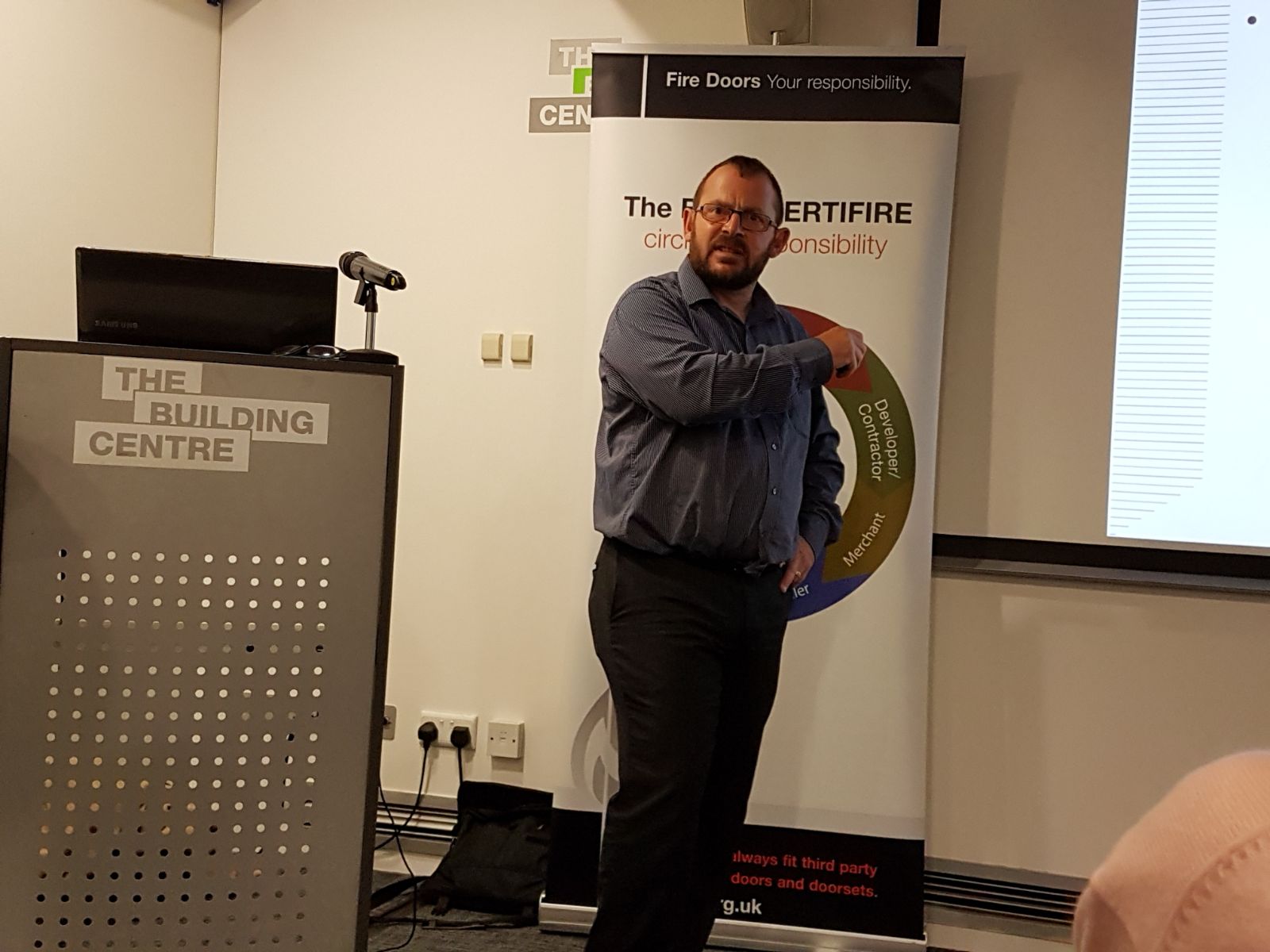
The GGF was pleased to be involved with 2017 Fire Door Safety Week, with FRGG chairman Stephen Bond presenting on fire resistant glazing at the campaign’s Fire Door Safety seminar
The Fire Door Safety Week campaign, run by BWF Certifire, took place from 25 September to 1 October this year and the GGF was present at a special Fire Door Safety seminar held at The Build Centre in London on 28 September.
Stephen Bond of Pilkington United Kingdom Limited, chairman of the Fire Resistant Glazing Group (FRGG), gave an informative presentation about getting fire resistant glazing right. The key topics covered followed the consistent theme of Fire Door Safety Week including component performance, specification, compatibility, traceability, and certification.
Best practice for fire resistant glazing was discussed in detail to ensure that the correct glass, glazing seals, glazing beads, fixings and frame were fully compatible under the required fire conditions. Further details can be found in the GGF Guide to Best Practice in the Specification and Use of Fire-Resistant Glazed Systems with some printed copies being available to those attending.
Stephen explained the different performance benefits of integrity and insulated fire resistant glazing and illustrated examples with video clips, one of which can be viewed on the GGF website. The full range of smoke control, heat insulation and integrity performances are available to ensure the correct protection can be provided for people and property. Fire Door Safety Week also gave those attending time to ask questions about regulatory requirements and product performance. These ranged from escape corridor requirements to the performance of non-fire rated glass types.
FIRE DOOR SAFETY WEEK EVENT GLAZING FIRE DOORS – THE ISSUES VS THE SOLUTIONS
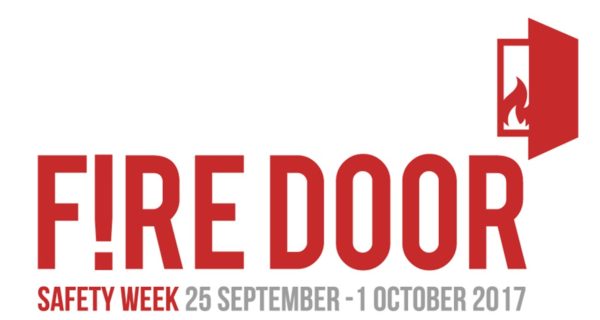 Hodgson Sealants are hosting a big event as part of our commitment to Fire Door Safety Week. At our event we will be joined by industry leading guest speakers and our own technical services team to discuss the issues and solutions associated with glazing fire doors.
Hodgson Sealants are hosting a big event as part of our commitment to Fire Door Safety Week. At our event we will be joined by industry leading guest speakers and our own technical services team to discuss the issues and solutions associated with glazing fire doors.
Lunch will be provided along with refreshments throughout the morning. You are also welcome to join us at our offices in Beverley for a factory tour.
Agenda
• 9.00 am Registration – tea and coffee
• 9.30 am Welcome – Kevin Nickolay, Hodgson Sealants
• 9.40 am Speaker – Kevin Hulin, Fire Door Safety Scheme
• 10.10 am Speaker – Hodgson Sealants, Technical Services Team
• 10.40 am Speaker – Charlotte Sinclair, Vetrotech Saint-Gobain
• 11.10 am Refreshment break
• 11.25 am Speaker – Iain McIlwee, CEO, BWF
• 11.55 pm Speaker – Jon Osborn, Technical Director, Exova Warringtonfire
• 12.25 pm Questions & Answers
• 12.40 pm Lunch
• 1.10 pm Proceed to Hodgson Sealants
• 1.30 pm Factory tour
• 3.00 pm Event close
Speakers
A number carefully selected speakers will be attending the event to cover topics covering all aspects of fire door glazing. Guest speakers include; CEO of BWF, Iain McIlwee (pictured), Kevin Hulin, a fire safety specialist, Charlotte Sinclair of Vetrotech Saint Gobain and Jon Osborn Technical Director of Exova Warringtonfire.
Venue
Beverley Racecourse can be found on the A1174, close to York and Hull.
The Racecourse, York Road, Beverley, East Yorkshire, HU17 8QZ
The factory tour will be held at Hodgson Sealants, Belprin Road, Beverley, East Yorkshire, HU17 0LN
Register Your Interest
Places are limited at the event so you are invited to register your interest in attending this event and we will contact you to confirm your place. You can signup through the below link to our website.
GGF Launches Employee Safety in the Glass and Glazing Industry Publication
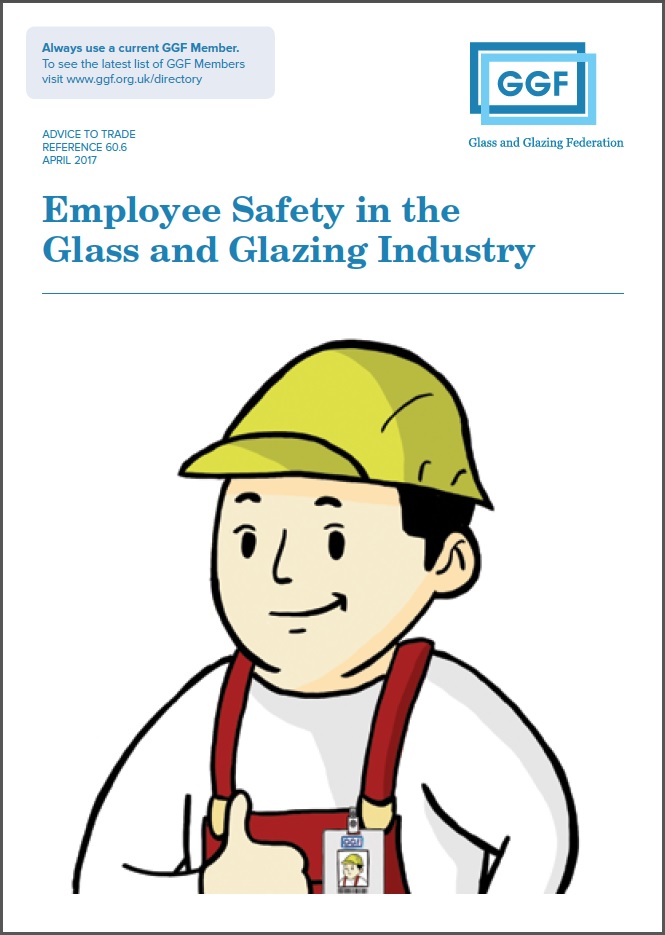
The newly updated easy-to-use reference guide gives an overview to prepare you for working safely in the glass and glazing industry. It provides advice on what to do when you come across a common hazard associated with your work and gives basic direction as to what actions you must take. It also takes account of recent changes in Health and Safety legislation and emphasises the need for all those involved in the industry to identify, assess and manage risks, working together as a team.
Phil Pinnington, GGF Director of Health and Safety commented, “The re-focus with an emphasis on the practical application of safety practices has been keenly sought, especially by small and medium sized enterprises. These companies have a willingness be proactive with Health and Safety and now have a working framework to help. I’m delighted that we’ve been able to bring such practical guidance to the industry. I’m confident that the handbook and assessment will be well received.”
For the first time the guide encompasses not only the flat glass manufacturing sector but the customer facing installers. It’s been compiled with the most up to date information and guidance available and aims to help employees understand both the legal aspects of safety but the practical applications. Supporting the handbook, a simple online assessment has been developed where employers can satisfy themselves their workers have a good understanding of the basic safety concepts. This then helps make sharing their own safety systems so much more effective.
The new publication is available as a free download to GGF Members here, or is available to purchase from the GGF Shop here: https://shop.ggfmembers.com/employee-safety-in-the-glass-and-glazing-industry-ref-30-8/
GGF Launches New Safety and Security Glazing Good Practice Guide
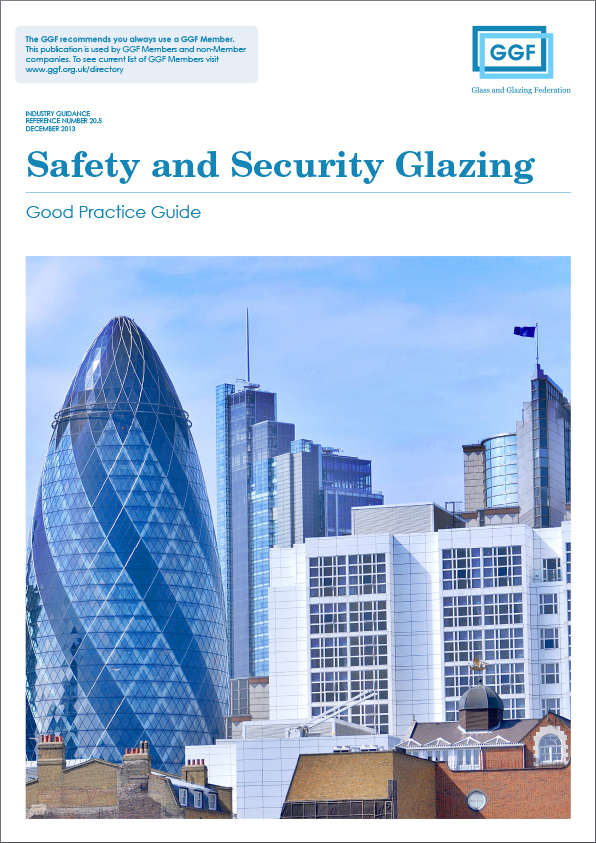
The new guide covers the use of safety and security glass and glazing in buildings including not just windows, doors and curtain walling but also interiors such as shower enclosures and elevator enclosures.
The guide also details the key performances of safety and security glazing when subject to manual, ballistic and explosive attacks. Other areas concerning the safety of persons such as overhead glazing, protective glass barriers, glass stairs and floors are also comprehensively covered.
The guide, which effectively brings all the key information on safety and security glazing into one publication, is primarily aimed at informing architects, specifiers, building planners, surveyors and building managers.
Steve Rice, Director of Glazing and Secretary of the GGF Glazing Executive, has been instrumental in the production of this publication by collaborating with several Industry experts who sit on the GGF Safety and Security Technical Group. Steve commented, “This publication plugs a huge gap in the current industry information on safety and security glazing. Companies in the Industry have been waiting a long time for a comprehensive authoritative publication that not only covers the subject in detail, but also supplies the technical datasheets for reference, to help companies manufacture and install security and safety glazing to prevent or resist accidents occurring.”
Every Member Company has been sent a printed copy of the safety and security glazing – Good Practice Guide, but it also available for download in the GGF Members Area of the GGF’s website; https://www.ggf.org.uk/publication/safety_and_security_glazing_good_practice
For more information on the GGF Safety and Security Glazing Groups please contact Steve Rice, srice@ggf.org.uk or visit the Groups’ web pages;
https://www.ggf.org.uk/group/safety-glazing-group
Download a FREE Health & Safety Handbook Template and Keep Your Staff Safe
Keeping your workplace safe is a top priority, and having clear guidelines makes it easier for everyone. That’s why a Health & Safety handbook is a must!
It provides you with a solid foundation to help build a handbook that fits just right for your business, so everybody is aware of all the Health & Safety policies across your organisation and what’s expected of them. But where do you start and what should you include?
Our Partner Citation have done the work for you! They have created a go-to template for creating your own Health & Safety handbook with practical tips and easy-to-follow advice.
What’s Inside?
· Amendments and table of contents
· How to write the introduction
· The three main statements to include
· Setting out your safety management structure
Download your free template here: https://tinyurl.com/bdduj756
If you’d like to chat about how Citation can help with the HR and Health & Safety side of your business, just fill in their call-back form, and they’ll get right back to you.
Remember to quote ‘Glass & Glazing Federation’ when enquiring to access preferential rates.
Joint Glazing & Fenestration Executive 10:30am
The Group meets regularly to discuss issues affecting the market. The topics in meetings can cover technical, political, legislative, health and safety, marketing/pr and training.
Glazing Executive meeting 10:30am
The Group meets regularly to discuss issues affecting the market. The topics in meetings can cover technical, political, legislative, health and safety, marketing/pr and training.
Glazing Executive Solihull Moors 10am
The Group meets regularly to discuss issues affecting the market. The topics in meetings can cover technical, political, legislative, health and safety, marketing/pr and training.
Energy Efficient Glazing: A Useful Guide
In any property heat will be lost through windows and doors, however this heat loss can be reduced when a home has energy efficient double or triple glazing.

Energy efficient glazing helps keep heat inside the home and, in combination with other home energy efficiency measures (such as cavity wall insulation, loft insulation and an energy-efficient heating system), can lead to a reduction in annual heating bills.
And that’s just the start. The benefits of having energy efficient glazing installed in your home can also include a reduced carbon footprint, improved home security and noise reduction.
If you’re considering investing in energy-efficient glazing, you’re certainly not alone. There’s a lot to gain from this home improvement, but of course there is also a lot to consider.
This short guide will take you through some key information that will help you make an informed decision.
What is energy efficient glazing?

Energy-efficient glazing is the term used to describe glazing consisting of two or more glass panes within a sealed unit. This includes double and triple glazed windows and similar units found within doors.
Energy-efficient windows and doors consist of a framing material (timber, aluminium, PVC-U or composite) into which one or more glass sealed units are fitted according to the style of the window or door.
Energy-efficient glazing is rated according to its ability to reduce the amount of heat that can pass through the window, the capacity for sunlight to travel through the glass unit, and the capacity for air to move through the unit.
Commonly, the highest-rated glazing according to efficiency is made with Low-Emissivity Glass which has a special coating on the inner surface of one pane, enabling light to travel through whilst reflecting heat back into the room.
What is in between the glass panes of a sealed unit?
The air gap limits the amount of cold air able to get into your home. It does this by acting as an insulator and is completely sealed.
The space between the glass panes is filled with air or gas such as argon, krypton or xenon. These help reduce heat loss through the unit. When gas such as argon – which has low conductivity – is used within this space, the window is then even more efficient at keeping heat inside the property and also at interfering with sound waves from inside or outside the house, reducing noise pollution.
Sealed units also have a strip in between the panes, made from metal or polymer. This strip is called a spacer which can contain a drying agent that deals with any moisture that is trapped in the space between the sheets of glass.
The type of frame material used
As with the glass itself, the frame material used in energy-efficient windows and doors is also important.
There are several options here:
- PVC-U has many benefits including performance longevity (usually 20 years or more) and is recyclable.
- Wooden frames are environmentally friendly and are often specified for properties where the use of original materials is necessary, such as those within a conservation area.
- Aluminium frames are an eco-friendly, modern choice because the creation of the material is low impact, recyclable and the slim look of the frames is desirable.
- Composite frames are composed of a combination of wood and aluminium or plastic.
Energy rating and u-values
For ease of purchase, certain window manufacturers label the energy efficiency of their windows with an energy rating ranging from A++ to C, A++ being the most efficient. This rating system has been developed by the British Fenestration Rating Council (BFRC) and it takes into consideration the entire window.
When this energy rating is given, a whole window u-value is also calculated. The u-value refers to how easily heat can pass through the unit. The u-value scale works in the opposite way to an energy rating, in that the higher the u-value, the more easily heat can pass through the window and the window is less efficient.
The benefits of energy-efficient glazing
There are many benefits of EEG, which are increasing all the time as technology and building techniques advance, and our eco-awareness increases.
Key benefits include:
- Improved energy efficiency: Energy-efficient glazing may form part of a wider range of energy-saving measures. If your home also contains cavity wall insulation, loft insulation and an energy-efficient heating system, these can all work together to reduce the amount of energy needed to heat your home. As a consequence, you can enjoy lower energy bills and a reduced carbon footprint.
- Reduced noise pollution: Sealed double and triple glazing can be effective at reducing medium to high-frequency noise, creating a more comfortable, private and peaceful home environment.
See more: Glazing and noise reduction in homes
- Improved thermal insulation: Energy efficient glazing can help to keep your home warmer in winter and cooler in summer. The air or gas gap between the panes of glass in a sealed unit provides an extra layer of insulation. This increased thermal resistance reduces the amount of heat that can escape the home during the colder months. In summer the reverse occurs, and the windows help keep the heat outside, keeping the home cooler.
- Reduced condensation: Energy efficient windows and doors help reduce the risk of condensation which occurs when a cold surface and moist air meet. The resulting moisture can potentially damage the window frame and if it is particularly bad, may even affect other areas of the room.
See more: How double or triple glazing helps reduce condensation
- Safety and security: As there are two or more panes instead of one, energy-efficient glazed windows offer a more secure barrier against unwanted entry than a single glazed window. The level of security can be enhanced further when laminated glass is used.
- Cost savings: Assuming all other measures have been taken, Installing energy-efficient windows can save you money over the long term by reducing the amount of energy required to heat your home.The savings you gain from energy-efficient glazing will depend on a number of factors, including the size of the home, the type of windows you purchase and your energy supplier. For an indication of the potential savings, you could enjoy based on your home and windows.
- A more comfortable living environment: Lower heat loss, plus reduced noise, helps toward a feeling of a much more comfortable home.
- Increased home value: Making energy-saving improvements to your home has the potential to boost its value. Potential homebuyers are increasingly aware of the eco-credentials of any house they consider purchasing. According to a report conducted by the Government based on property sales made between 1995 and 2011, a homeowner making energy-saving improvements to their home could see a 14-38% increase in value as a result.
A note on the importance of ventilation
In newer dwellings with higher-efficiency insulation, a lack of adequate ventilation can increase the risk of condensation forming on internal surfaces – including on windows and other glazed surfaces. A way of reducing this risk is to ensure each room has adequate ventilation, such as trickle ventilators or other forms of ventilation.
Continuous improvements in frames, glass and gas combinations mean the consumer’s energy-efficient window choice is increasing all the time. Energy-efficient glazing is a beneficial addition to any modern
Fire Resistant Glazing
The Group meets regularly to discuss issues affecting the market. The topics in meetings can cover technical, political, legislative, health and safety, marketing/pr and training.
Joint Glazing & Fenestration Executive
The Group meets regularly to discuss issues affecting the market. The topics in meetings can cover technical, political, legislative, health and safety, marketing/pr and training.
Glazing Executive meeting
The Group meets regularly to discuss issues affecting the market. The topics in meetings can cover technical, political, legislative, health and safety, marketing/pr and training.
Fire Resistant Glazing
The Group meets regularly to discuss issues affecting the market. The topics in meetings can cover technical, political, legislative, health and safety, marketing/pr and training.
Joint Glazing & Fenestration Executive
The Group meets regularly to discuss issues affecting the market. The topics in meetings can cover technical, political, legislative, health and safety, marketing/pr and training.
Fire Resistant Glazing
The Group meets regularly to discuss issues affecting the market. The topics in meetings can cover technical, political, legislative, health and safety, marketing/pr and training.
Glazing Executive
The Group meets regularly to discuss issues affecting the market. The topics in meetings can cover technical, political, legislative, health and safety, marketing/pr and training.
Ready Your Business for 2024 with Health and Safety Experts Citation
Are you set for 2024?
We know it can be difficult to stay on top of all the recent changes, trends and legislation updates in the HR and Health & Safety world. But with the Christmas season hastily coming up, have you made time to review these before the new year?
If not, no need to worry! Our Partner Citation have made things simpler for you! Join their free 60-minute webinar on the 5th of December 2023 at 2pm for a complete run down of all the key HR and Health & Safety legislation you need to know.
Their host and business owner, Flora Neville, will talk you through:
– Latest updates in Employment Law and Health & Safety legislation
– What the Health and Safety Executive (HSE) are cracking down on and their enforcement activities
– How you can be prepared for upcoming changes to Employment Law
– Recent trends in HR and Health & Safety
Grab your spot today by simply clicking below.
Secure my spot: https://bit.ly/3QZbjI8
If you’d like to chat about how Citation can help with the HR and Health & Safety side of your business, just give them a call on 0345 844 1111, or fill in their get a quote form, and they’ll get right back to you. Remember to quote ‘Glass & Glazing Federation’ when enquiring to access preferential rates.

 Emergency Glaziers
Emergency Glaziers GGF Shop
GGF Shop MyGlazing.com
MyGlazing.com Find a GGF Member
Find a GGF Member